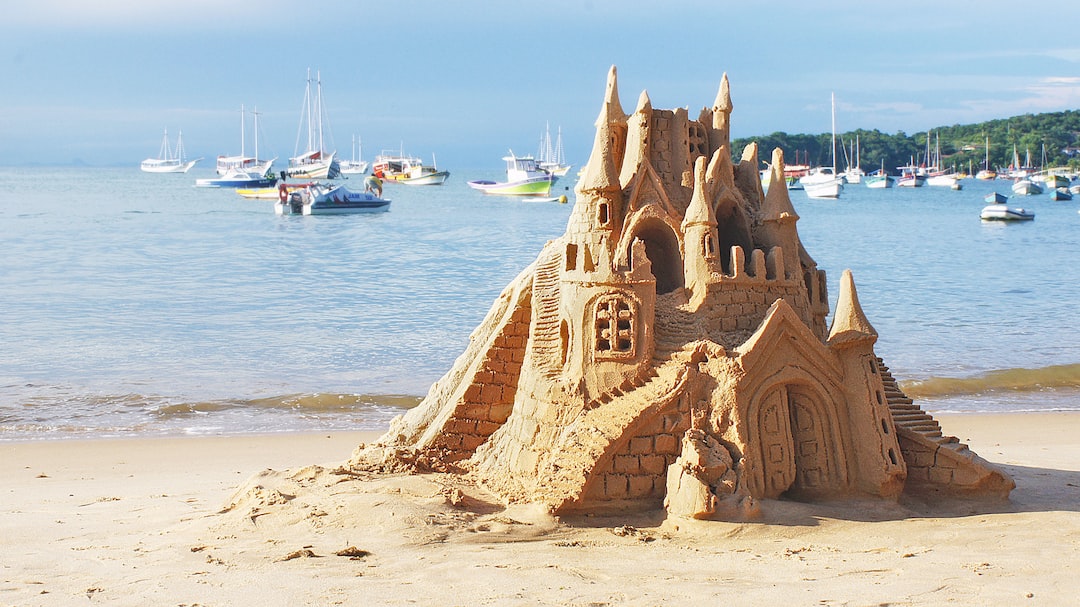
Mostly, we go through life seeking objects of our desire, laboring under the false idea that happiness can be found in wealth, status, or a good reputation.
We expend tremendous amounts of energy toward obtaining things and attaching ourselves to them, only to find disappointment when these things don’t bring us the happiness we desire.
You’ve heard the expression, “You can’t take it with you.” And we all intellectually know that to be true, but do we really live our lives as if it were true? Consider the following story:
Some children were playing beside a river. They made castles of sand, and each child defended his castle and said, ‘This one is mine.’
They kept their castles separate and would not allow any mistakes about which was whose.
When the castles were all finished, one child kicked over someone else’s castle and completely destroyed it. The owner of the castle flew into a rage, pulled the other child’s hair, struck him with his fist and bawled out, ‘He has spoiled my castle! Come along all of you and help me punish him as he deserves.’
The others all came to his help.
They beat the child, their friend.
Then they went on playing in their sand castles, each saying, ‘This is mine; no one else may have it.
Keep away!
Don’t touch my castle!’
But evening came, it was getting dark and they all thought they ought to be going home.
No one now cared what became of his castle.
One child stamped on his, another pushed his over with both hands.
Then they turned away and went back, each to his home.
Do we act any differently than these children?
We live our lives building castles in the sand only to leave them behind as meaningless when the long night of death falls.
Imagine for a moment that you accomplished everything you wanted in life. You succeeded in all your worldly affairs.
Perhaps you’re Jeff Bezos and you’ve accumulated a $100 billion fortune.
Or perhaps you’re Tom Brady and you won seven super bowls.
While these are amazing accomplishments, both of those men will die, and when they do, they won’t be taking any of their wealth or attainments with them.
In fact, if they cling to their attainments on their deathbed, they will feel anguish and sorrow, and they will endure a great deal of suffering.
How will their worldly attainments benefit them then?
You are going to die.
You could die today.
None of your worldly attainments or possessions are important.
You won’t be taking any of it with you.
Shortly after your death, your possessions will be disbursed to various people, and your corpse will be disposed of.
A form of you remains in the memories of those who knew you. Those who outlive you may remember you kindly, or they may not.
You may have a memorial headstone, or no permanent record of you may exist at all.
Everything you worked for, struggled against, hoped, dreamed, felt — everything will be summarized by a dash between the dates on your gravestone.
Most people won’t have any more details on your life than what’s contained in that dash.
After your funeral service, most people will go back to their self-important thoughts, and thoughts of you will arise less and less often until you are finally forgotten.
A hundred years after your death, everyone who knew you will also be dead (not that they spent much time remembering you anyway), and nobody will visit your gravestone. Even your gravestone will finally be forgotten or destroyed.
All evidence of your existence will be gone.
As Styx pointed out in Nothing Ever Goes as Planned: “Even Pharaohs turn to sand, Like a drop in the ocean.”
Given these facts, why would you waste your time building castles in the sand?
Given these facts, why would you attach yourself to anything?
If you don’t attach yourself to life and worry about everything, life becomes a grand adventure full of fun and excitement.
When items you desire come to you, you enjoy them with thanks, and then you let them go.
As Freddie Mercury said in Bohemian Rhapsody: “Carry on, carry on, As if nothing really matters.”

